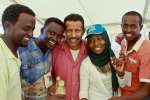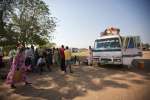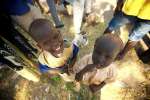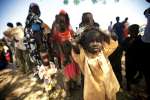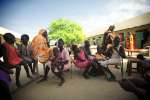US-bound teen dreams of helping his native Sudan despite identity crisis
News Stories, 5 October 2006
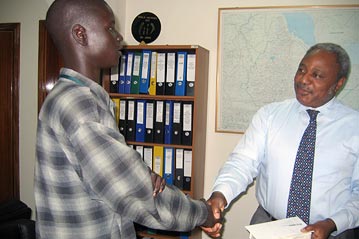
DIMMA CAMP, Ethiopia, October 5 (UNHCR) – Deng Duot flew out of Ethiopia for a new life in the United States late last month, but the 16-year-old Sudanese refugee felt like he was going into exile for the first time in his life.
His dilemma is one faced by many refugees born and raised in host countries and now facing repatriation or resettlement overseas. The teenager left for Atlanta, Georgia on September 25 with his mother, two brothers and sister under a UNHCR resettlement programme.
Duot was born at this camp in western Ethiopia after his parents crossed from neighbouring southern Sudan in 1987 to escape the bitter North-South conflict in their country, which drove hundreds of thousands of people into exile. His father was later killed fighting for the rebel Sudan People's Liberation Army.
Home is a vague concept for Duot, and thousands like him, and the only picture they have of Sudan is gleaned from fragmented stories recited by their parents. They end up feeling more affinity for their host countries, whose language and culture many adopt.
"Ethiopia," Duot said without hesitation, when asked where he considered himself from. "I was born and brought up here and I have never been to the country my parents call home," he added in an interview shortly before leaving Ethiopia.
But, inevitably, he does feel some connection to Sudan through his parents. And he wants to play a role in getting the country back onto its feet. "My mother has been telling me that lack of justice and peace was the reason for the family's flight and I believe ignorance is the mother of all the troubles our people have been suffering from," said Duot, who is determined to pursue his studies.
"By enrolling me in school, UNHCR has shown me the way and I will repay my debt to the organisation by excelling in my studies, which I will be using to the betterment of my people," he vowed.
Duot has been apprehensive about leaving Ethiopia since 2004, when the peace process in Sudan was progressing well and repatriation seemed to be around the corner. He regarded repatriation as a displacement rather than a return home – and he wrote a moving poem about his fears and frustration at that time.
UNHCR officials saw the poem – reproduced below – and invited him to recite it at a World Refugee Day ceremony in Addis Ababa in June 2004. It was also reproduced in the UNHCR staff publication, Dialogue, and used on a Christmas card issued by a Dutch aid agency.
In the end, Duot's family were offered resettlement in America. And while the teenager is confused about his identity, he is bright enough to realise that he is being given a great opportunity – and he intends to make the most of it. He described life in the United States as "exile," but added that "this time I know this to be a rewarding and temporary one."
A grade A student, he wants to study geology in America. As a geologist, he could help exploit Sudan's vast mineral resources and use them for the good of the Sudanese people. "If for some reason I miss the chance to go to a school of geology, I will study sociology and become a social worker and devote my life to assisting people in trouble – such as refugees," he said.
By Kisut Gebre Egziabher in Dimma Camp, Ethiopia
Becoming a Refugee
The actual moment
Of exile
Is like an illness.
You are ill
With rage.
To each family,
It means closing the door
On friends, culture, your native country.
One year is an exile,
Compared to 10 years.
Ten years means nothing
In the history of the country,
But for a human being
Is a long time.
For a child,
A lifetime.
Some of us
Were born in Ethiopian camps.
Peace is around the corner.
What I call home
Will still be
Another exile,
Because
I don't know home.
What an irony.












